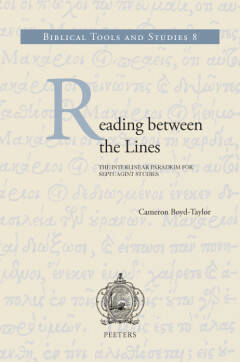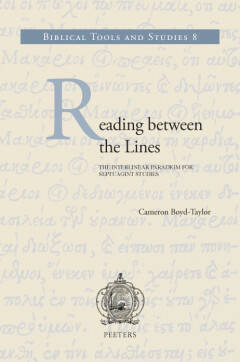
Bedankt voor het vertrouwen het afgelopen jaar! Om jou te bedanken bieden we GRATIS verzending (in België) aan op alles gedurende de hele maand januari.
- Afhalen na 1 uur in een winkel met voorraad
- Gratis thuislevering in België vanaf € 30
- Ruim aanbod met 7 miljoen producten
Bedankt voor het vertrouwen het afgelopen jaar! Om jou te bedanken bieden we GRATIS verzending (in België) aan op alles gedurende de hele maand januari.
- Afhalen na 1 uur in een winkel met voorraad
- Gratis thuislevering in België vanaf € 30
- Ruim aanbod met 7 miljoen producten
Zoeken
€ 149,95
+ 299 punten
Omschrijving
Known primarily through its association with the New English Translation of the Septuagint, the interlinear paradigm promises to become a key methodological tool in the field of Septuagint Studies, greatly clarifying the task of historical critical scholarship. It has, however, yet to receive a comprehensive theoretical statement. The present volume addresses this need. Drawing upon the relatively young discipline of Descriptive Translation Studies, C. Boyd-Taylor, one of the principal architects of the paradigm, outlines a conceptual framework within which it may be critically assessed. He then offers a descriptive analysis of selected texts from the Septuagint, which aims at delineating the normative dimension of the translator's work. In the concluding chapters the author maps out some of the implications of the paradigm, charting a tentative course for future scholarship. Reading between the Lines, will be of interest to scholars and students of biblical studies, Jewish studies, translation studies and anyone else interested in the Hebrew-Greek translations of antiquity.
Specificaties
Betrokkenen
- Auteur(s):
- Uitgeverij:
Inhoud
- Aantal bladzijden:
- 483
- Taal:
- Engels
- Reeks:
- Reeksnummer:
- nr. 8
Eigenschappen
- Productcode (EAN):
- 9789042922501
- Verschijningsdatum:
- 16/05/2011
- Uitvoering:
- Hardcover
- Formaat:
- Genaaid
- Afmetingen:
- 165 mm x 246 mm
- Gewicht:
- 952 g

Alleen bij Standaard Boekhandel
+ 299 punten op je klantenkaart van Standaard Boekhandel
Beoordelingen
We publiceren alleen reviews die voldoen aan de voorwaarden voor reviews. Bekijk onze voorwaarden voor reviews.









